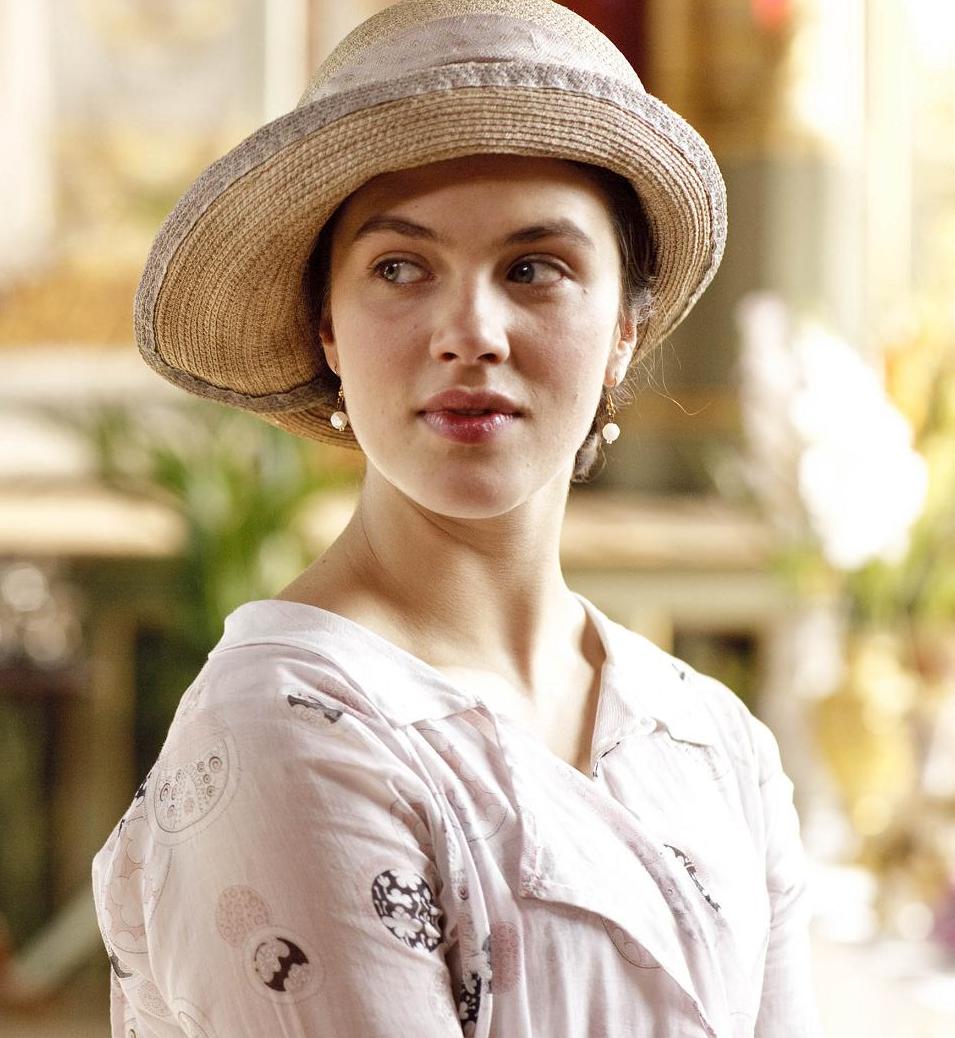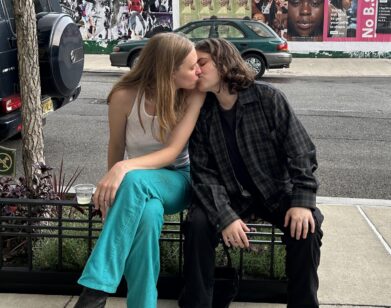Jessica Brown Findlay’s Sybil Liberties

ABOVE: JESSICA BROWN FINDLAY IN DOWNTON ABBEY.
In the first season of Downton Abbey, Lady Sybil wears harem pants. It’s a scandalous move: the rest of the women in the aristocratic family central to the period drama are dressed in gowns to dine. Her grandmother—the dry, snobbish and hilarious Dowager Countess, played by Maggie Smith—looks aghast. As Sybil smiles smugly, she joins the ranks of edgy female television heroines: a sort of distant cousin to characters like Lindsay Weir and Rory Gilmore. (The pants, it should be noted, have their own Twitter feed.)
The 4.2 million people who watched the American premiere of the second season last Sunday saw Sybil decide to join the World War I effort and become a nurse. The actress who plays Sybil, Jessica Brown Findlay, told us she much prefers wearing the nurse costumes to eveningwear.
Brown Findlay, 22, is making a habit of playing convention-defying young women; her role in the film Albatross, out tomorrow, sees her as an aspiring writer who carries on an affair with a friend’s father. We talked with her about her roles, the lamps of Downton Abbey, and her start as a ballet dancer.
ESTHER ZUCKERMAN: Congrats on the return of Downton Abbey to America, though I guess it must feel like it’s been done for a while for you.
JESSICA BROWN FINDLAY: Yeah, it’s great. I suddenly realized the other day that it was coming out on Sunday. I woke up to a couple of messages from friends I have in the States.
ZUCKERMAN: Did you have any idea when you started filming the first season of Downton that it would be such a widespread hit, not only across Britain but also in America?
BROWN FINDLAY: Not at all. It was really surreal. We knew it was a good job and knew it was a good thing to do. It felt great filming it. Everyone was really enthusiastic about what we were doing.
You don’t automatically assume everyone will fall for a period drama. Especially across the pond, you think it’s all very British and, you know, whatever. To get that kind of response was mind-blowing. All of us were pinching ourselves. When we went back on to the second series we were all adamant, like, “Right, keep your head down. Keep working really hard. Don’t let anyone down. Keep the standards up.” It was kind of a surreal, bizarre, but wonderful response to something.
ZUCKERMAN: Sybil is a character a lot of women identify with, because she’s perceived as the most modern…
BROWN FINDLAY: Yeah.
ZUCKERMAN: One of the quotes that I love was in an article on Salon.com about Downton. The writer comments that Sybil “seems designed for the enthusiastic identification of the ladyblogging set.” I was wondering what playing that type of character is like for you.
BROWN FINDLAY: It’s amazing. She is modern, and she is the most forward-thinking character. I can relate to her more because she demands and wants her independence, and is independent and quite adamant about the way she wants to live her life and she’s not willing to live it by the rules. It’s kind of funny the idea of the downstairs characters wanting to move up, but there’s also this idea that someone upstairs doesn’t necessarily see it as a privilege, they only see it as a trap in its own right. That’s really fun to play with.
ZUCKERMAN: If the first season about Downton for Sybil is founding out what boundaries she can break learning about politics, wearing the harem pants, what is the second season to her? We’ve seen the first episode over here, where she decides to become a nurse.
BROWN FINDLAY: Mostly for Sybil it’s really about, she goes and becomes a nurse. She discovers and indulges in the fact that she can have a job. She has a responsibility. She can serve someone else rather than be served. Sybil ends up demanding and making decisions that impact everyone in the house—from Daisy in the kitchen to Lord Grantham. They are all affected by the war. That’s made even greater by Sybil’s adamant determination. They all take responsibility, and don’t live in denial that this war is going on.
ZUCKERMAN: One of the links I’ve seen online is a “Which Downton character are you?” quiz. Do you think you would be Sybil or one of the other characters?
BROWN FINDLAY: I’m not sure. I’d like to think I’d be Sybil, but I don’t know if I’m brave enough. I don’t know if I would be bold or brave enough as Sybil. I think I’m more like Edith, [who’s] not quite found her place in the world yet. I think Edith’s character is one of the most exciting. I think come the third series, she will find a real liberation in the relaxation of rules and lifestyles that the ’20s brought. I’m rather envious of Laura [Carmichael]’s character. There’s something also wonderful about being able to play someone who’s a bit of a bitch. That’s great.
ZUCKERMAN: There’s an entire Tumblr dedicated to the lamps on the show, simply the lighting fixtures. What is your reaction to things like that? To people picking out the nuances like that? And have you ever noticed the lamps?
BROWN FINDLAY: I noticed the lamps when I was watching Downton the second series, and I feel like a few looked like really bizarre nipples. But I hadn’t really noticed. Sometimes people see stuff that you are seeing every day on set and don’t think twice about, and it’s really funny when people pick up on these things and you’re suddenly going to set and you’re like “Oh yeah, it does look weird,” a weird, like, sofa, or, “Isn’t that pillow really odd looking.” It’s really strange. Something you never think of and people notice that. It’s really very funny. I love when people become obsessed with Downton.
ZUCKERMAN: Moving on from Downton, you play another rebellious type—very different from Sybil—in Albatross, which opens in New York soon. Can you tell me about that?
BROWN FINDLAY: Albatross was my first job. It was the most amazing role to go and play, and our director Niall MacCormick just gave me so much freedom to play this ridiculous character. She’s someone who, on the surface, likes to shock and likes to muck around, and thinks she knows everything, whereas actually by the end of the movie, she discovers that maybe she doesn’t know as much as she thinks she should and finds liberation in discovering that actually it is the rest of her life that will teach her the lessons she learns and not the one she tries to teach herself. It was an amazing role to go and take that kind of character and play around with that.
I was allowed to buzz about and be very silly and come up with little mannerisms and things like that. It’s a wonderful sort of coming of age movie. To see someone falter and to fail, but then come out of it having learned a lot, but also accept the fact that she’s not as bulletproof as she would hope that she would be.
ZUCKERMAN: It seems from these two roles you are kind of put in these boundary-breaking characters, who like to push their place in like. Is that something you identify with at all? Is it a trend for you?
BROWN FINDLAY: Yeah, I think it does. I think I have been able to relate to the characters in their rebellious nature, but also in their naïveté. Sybil, in the first series is hopeful of so many things, and the reason she’s able to be so hopeful and optimistic is at the end of the day she doesn’t know a lot about a lot of stuff, and vice versa with Emelia. I think the way I got into acting was a lot about trial and error, and learning on the job, and falling over and making mistakes, and learning from that. I think there’s something rather wonderful in that and the fact that everyone is flawed and sort of hopeless, but at the same time that’s where so many people’s strengths come from. I’ve been able to discover a lot of subsequently about myself and how I work, and that comes from playing those kind of characters. It’s a gift to be able to be given those sort of characters that do the things they do and make the decision that they make, because without having played those roles, I don’t think I’d be the actress I’m learning to be.
ZUCKERMAN: You started as a ballet dancer, am I correct?
BROWN FINDLAY: I trained as a ballet dancer—well, I started when I was two and a half, and was serious about it from when I was eight until I was 18. And then a series of operations meant that I had to stop dancing. A teacher from my old school before I went away to my ballet school came to visit me in hospital and said, “Look, you have to go and be in the city, and meet people who don’t know what Swan Lake is or what a plié is or any of that, and go and discover who you are without dancing.” I went away to London and discovered that the biggest thing about dancing that I couldn’t stand losing was the performance aspect, was becoming the character. Because in classical ballet, you’re portraying a narrative story and I just thought, “I’m still meant to do that.”
ZUCKERMAN: Back to Downton, in this season of Downton you’re wearing a lot of nurse’s garb and not the tightened-up formal dresses of Sybil’s role as a lady. Would you rather wear the nurses’ uniform rather than the gorgeous gown?
BROWN FINDLAY: Yes, no, definitely, much much easier to walk around in, far more comfortable, much more practical, no sort of sitting down going, “Oh my God, I can’t breathe.” All the girls when they are all trussed up and I’m still running around in my nurse’s uniform are rather envious of that fact. Whenever I read a scene where I realized I have to be in evening garb, I was like, “Oh God, no.” I got very used to being very comfortable.
DOWNTON ABBEY AIRS SUNDAY EVENINGS ON PBS. ALBATROSS OPENS TOMORROW IN NEW YORK.






